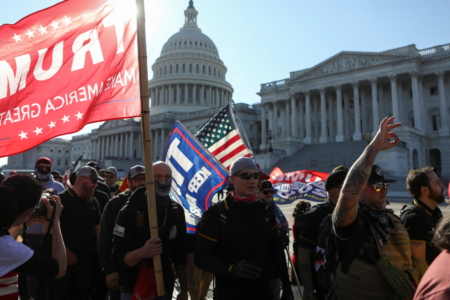The U.S. vs. Donald J. Trump: Stanford’s David Sklansky on Trump Indictment re Attempt to Overturn the 2020 Election

On August 1, DOJ Special Counsel Jack Smith announced charges against former president Donald J. Trump in the investigation of the Jan. 6 assault on the U.S. Capitol and the attempt to overturn the presidential election results. The charges against the former president are serious, including criminal counts against him over his efforts to stay in power after the 2020 election, a conspiracy to violate civil rights, a conspiracy to defraud the government, the corrupt obstruction of an official proceeding, and a conspiracy to carry out such obstruction. Here, Professor David Sklansky, a criminal law expert and former federal prosecutor, discusses the historic charges and how the case might proceed.
Can you explain the charges?
The indictment charges four offenses: a conspiracy to defraud the United States, a conspiracy to deprive people of their voting rights, a conspiracy to obstruct official proceedings, and an actual or attempted obstruction of official proceedings. All of the charges have to do with Trump’s efforts to overturn the results of the 2020 presidential election by false claims of election fraud.
Is one charge more important? Jack Smith said repeatedly in the indictment that Donald Trump “knew it was a lie,” referring to Jan. 6 and the false claims of election fraud, and reportedly told Mike Pence that he was “too honest.” Is that the heart of the case—that Trump knew he was lying and abused the powers of the presidency to attempt to overthrow the election?
Yes, that’s the heart of the case, and it is reflected in all four of the charges. I’d say the obstruction charges are the most important because they carry the heaviest penalty—a maximum of twenty years in prison—and because the legal theory supporting those charges is the most straightforward and best tested.

Professor of Law
How solid a case did Smith put forward?
The indictment isn’t evidence; it’s a set of allegations. We won’t know for sure how strong the prosecution’s case is until they present their evidence in court. But the indictment does outline a long series of statements that were made to Trump making clear that his claims of widespread voting were baseless.
But a few potential charges were left out, such as insurrection, perhaps to keep this indictment tighter—and less political.
It is difficult to speculate about why other charges, such as insurrection, were not included. But one possibility is that the prosecutors do not believe that they have evidence to prove beyond a reasonable doubt that Trump intentionally incited the assault on the Capitol on January 6, 2021. The indictment doesn’t actually charge him with doing that, although it does say that he “exploited” the rioting on January 6 to give further fuel to his false allegations of election fraud and to bolster his efforts to overturn the election.
It looks like most of the witnesses for the prosecution will be Trump allies or members of his administration—not partisan opponents. How challenging will it be for Smith and his team to get them to testify openly for the jury?
People can certainly change their testimony, but there’s no indication that any of the witnesses in this case are likely to do so. The congressional committee investigating the January 6 assault on the Capitol obtained videorecorded testimony from many former Trump allies and former members of the Trump Administration. That was the evidence at the center of the case they presented, as well.
How do you expect Trump’s defense team to persuade the jury that he is innocent?
The legal theories supporting the charges in this case actually aren’t that simple, largely because this case is so unprecedented. But if and when the case gets to trial, the issues for the jury will be factual, rather than legal, and they are likely to center around Trump’s mental state—whether he intentionally tried to overturn election results he knew were legitimate through lies and deception, or whether, instead, he was trying in good faith to challenge results that he honestly believed were fraudulent.
How will our legal system navigate three separate cases simultaneously—while Trump is campaigning for the presidency? Are you concerned about the potential of this case getting politicized—particularly regarding the timeline?
It will certainly be a challenge to coordinate the three criminal cases against Trump with each other and with the calendar of the 2024 presidential contest. And we may soon be talking about four, not just three, criminal cases against Trump, because state prosecutors in Georgia have signaled that they may be moving forward with their own prosecution, based in part on some of the same allegations in this week’s federal indictment.
Will the case be politicized? In a sense it already is politicized: Trump and his supporters are claiming, without evidence, that the charges are politically motivated. And Trump’s critics, both inside and outside the Republic Party, will certainly argue that these charges provide additional grounds to make sure that Trump never returns to the White House. Former Vice President Pence made that argument within hours of the indictment being released. But President Biden and Attorney General Garland have steered clear of commenting on or involving themselves in the Special Counsel’s investigation. And if the judges presiding over these cases do their jobs properly, they won’t let partisan considerations influence how they manage the cases or the schedules they impose.
Is this indictment the most serious of the three so far against him?
Yes, I’d say so, because it alleges what amounts to a direct assault on our constitutional democracy—an attempt to use fraud and deceit to stay in power even after being voted out of office.
The indictment seems to track closely to the Jan 6 Congressional Report, doesn’t it?
It does closely track the congressional report. There are details in the indictment that are new—like the allegation that Trump told Pence that Pence was “too honest.” But the overall story is the one told by the congressional committee.
The indictment mentions but does not name co-conspirators. Are some of the lawyers and Trump allies involved, like Rudy Giuliani and Jeffrey Clark, liable for prosecution too?
Yes, that’s a possibility. At least five of the six co-conspirators described in the indictment appear to be lawyers. Any of them could be named as defendants in a superseding indictment.
Can you say more about Smith not charging the co-conspirators in terms of his legal strategy?
Again, it is hard to speculate. It isn’t all that rare for federal indictments to describe co-conspirators that haven’t yet been charged. It could be that the prosecutors are still engaged in negotiations with some or all of the alleged co-conspirators, hoping to secure a plea agreement and their cooperation in Trump’s prosecution. Or the prosecutors may have concluded that including other defendants in this case would unduly complicate it and prevent a speedy trial.
Some commentators have called the indictment a historic document.
Well, it’s definitely historic. We’ve never before had a former president charged with felonies for trying to overturn the election that put him out of office.
Is there anything else you’d like to add?
At the press conference following the release of the indictment, Smith urged people to read the whole document. I think that is good advice.
David Alan Sklansky is the Stanley Morrison Professor of Law and Faculty Co-Director of the Stanford Criminal Justice Center. His most recent book is “A Pattern of Violence: How the Law Classifies Crimes and What It Means for Justice” (Harvard University Press, 2021).
